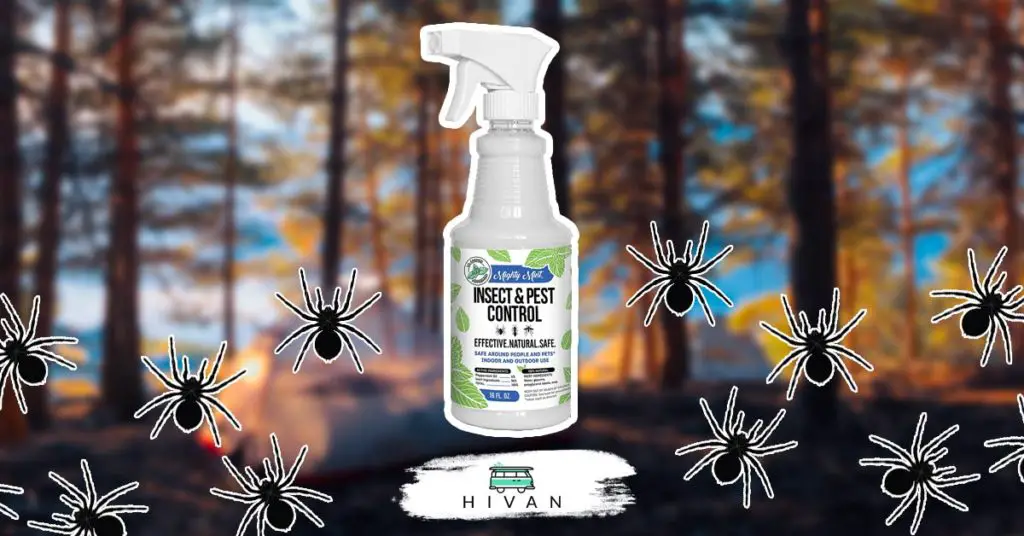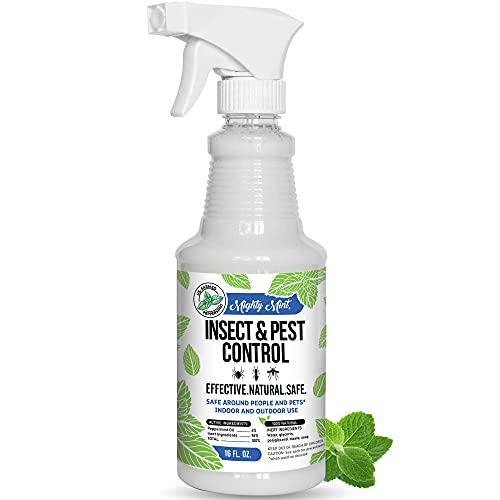Hi-van is supported by its audience. When you purchase using our links, we may earn an affiliate commission (no added cost to you). Learn more
Bug spray is often used to get rid of mosquitoes, ticks, ants, and other insects. However, a lot of them don’t say anything about spiders on the label. It’s easy to assume that these chemicals and natural ingredients would deter spiders, but how are you supposed to know if they work if there’s nothing on the spray?

Bug spray usually doesn’t repel spiders because the ingredients aren’t intended for them. While direct contact with the spray can kill spiders, the long-lasting effects are almost always non-existent. You can use sprays with vinegar, mint, or citrus to repel spiders around your home and vehicle.
Throughout this post, we’ll show you which bug sprays work on spiders, why some of them are ineffective, and what you can do about it. We’ll also break down what smells keep spiders away and which repellents are the best. Enjoy!
Does Bug Spray Keep Spiders Away?
Bug spray doesn’t keep spiders away unless it has mint, citrus, vinegar, and similar strong odors. Spiders are repelled by these scents and ingredients. You can use sticky traps with peppermint to remove most spiders. Direct contact is always the most effective method since spiders usually stay away from bug sprays.
Here’s how you can keep spiders away with repellents and other tools:
- Vacuum away all of the spider webs you can find in and around your house. The spiders are much less likely to return if they don’t have a home to come back to. Furthermore, this routine shows them that their home gets destroyed every time they spin a web. They’ll eventually get tired and relocate.
- Use natural repellents to prevent them from returning. Eucalyptus and peppermint work wonders when it comes to keeping spiders away from certain locations. Make sure you spray these ingredients in the corners and places where bugs usually build nests and webs. This includes near outdoor lights since spiders build webs near flying bugs.
- According to Burke Museum, it’s best to focus your efforts on spraying bug sprays directly on the spiders. Direct contact can kill them, but the study shows the residual effects aren’t very influential. The spiders will come back once it wears down, making it a short-term preventative.
- Keep your house clean and your laundry in a basket or hamper with a lid. Spiders love the smell of sweat. While it might be disgusting to us humans, spiders, ants, and many other bugs can’t get enough of it! Placing a lid over your dirty laundry prevents spiders from hiding in it between washing cycles.
- Use natural room sprays that you love and spiders hate. For example, Gear Trench explains cedar and lavender spray smells wonderful, but spiders dislike it. Your room will smell like a garden without the bugs! It’s always better to choose all-natural room sprays since they act as bug repellents and room fresheners.
This five-step process is a surefire way to keep the spiders away. That being said, if you’re dealing with poisonous spiders or are unsure if they’re dangerous, it’s always better to contact local pest professionals. You don’t want to risk opening an egg sac and having thousands of spiders crawling around your home or vehicle.
What Is the Best Spider Repellent?
The best spider repellent is vinegar or hairspray. Both of these ingredients have incredibly overwhelming smells and contain sticky textures. The spiders don’t want to go anywhere near them. It’s important to keep in mind that repellents typically aren’t removers, meaning they won’t kill the spiders.
- Safe
- Extra Concentrated for Long-Lasting Protection
- Natural Ingredients Proven Effective in the Real World
The Mighty Mint Spray is made with peppermint oil to kill and remove most spiders. Again, spraying the solution directly on the bug is much more likely to eliminate it. Prevention is equally as important as elimination, so don’t shy away from spraying the border of your home, campsite, or vehicle with this mixture.
Unfortunately, spiders take a lot more work to repel and prevent than mosquitoes, ants, and other insects. They’re persistent because they’ll go anywhere they can find food. You can use this to your advantage by removing their food source (i.e., ants, gnats, etc.), causing them to leave their webs. Wipe down the dusty cobwebs, and you’ll be good to go!
Use this two-step combination (essential oils and food source removal) to repel the spiders better than any artificial bug spray on the market.
What Smells Do Spiders Hate?
Spiders hate smells like peppermint, vinegar, chestnuts, citrus, and eucalyptus. Place plants with these ingredients around your house or use their essential oils to repel the spiders. Some spiders dislike certain scents more than others, so make sure you research the species found around your home before choosing the products.
Spiders dislike these scents because they’re overpowering and don’t let them find their prey. Many minty or vinegary odors irritate their hair, legs, and eyes, which makes the place uninhabitable. They’re quite effective at repelling large populations of spiders, especially if they haven’t been in the home for too long.
Contrary to popular belief, spiders have a very strong sense of smell. They can smell, feel, and taste odors that drift from several feet away, despite their small size. Planting mint is an excellent trick to repel the local spider population; Just make sure you trim the plants since mint can quickly take over your garden!
Note: All spider species have different additives that repel them. While the ones mentioned above are very effective, some of them could actually do the opposite. For example, Live Science claims some spiders don't mind acidic smells, such as those found in sweat. On the other hand, many spiders will steer clear of anything acidic. Research the spiders before choosing your tools.
Conclusion
Now that you know which bug sprays are best for spiders, you can keep your belongings free of creepy critters—no more dealing with bites or spider webs!
Remember to spray a small area of fabric before coating your bed, clothes, or furniture with these chemicals and natural ingredients. Spot treatment lets you know if it’s effective and if it’ll cause damage to your belongings.
Find this content useful 🙂 ?
Subscribe to our Newsletter and get a free Solar Electric Diagram + shopping list.


